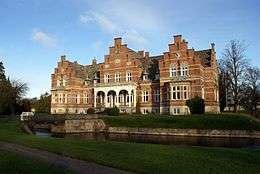Lolland
 Fuglsang Manor, now a major cultural centre on the island | |
 | |
| Geography | |
|---|---|
| Location | Baltic Sea |
| Coordinates | 54°46′10″N 11°25′28″E / 54.76944°N 11.42444°ECoordinates: 54°46′10″N 11°25′28″E / 54.76944°N 11.42444°E |
| Area | 1,243 km2 (480 sq mi) |
| Administration | |
| Region | Region Zealand |
| Municipality | Lolland Municipality, Guldborgsund Municipality |
| Largest settlement | Nakskov (pop. 13,886) |
| Demographics | |
| Population | 62,578 (2013) |
| Pop. density | 52.9 /km2 (137 /sq mi) |
Lolland (Danish pronunciation: [ˈlʌˌlanˀ]; formerly spelled Laaland, literally "low land") is the fourth largest island of Denmark, with an area of 1,243 km2 (480 sq mi). Located in the Baltic sea, it is part of Region Sjælland (Region Zealand). As of 1 January 2013, it has 62,578 inhabitants.[1]
Overview
Lolland is also known as the "pancake island" because of its flatness: the highest point of the entire island is 25 m (82 ft) above sea level, just outside the village of Horslunde. The island has been an important communication highway, among others for Nazi Germany during World War II. Historically, sugar beet has been grown in Lolland. Sugar is still a major industry, visible from the large number of sugar beet fields.
The largest town of Lolland is Nakskov, with 15,500 residents. Other main towns are Maribo (6,000 residents), which hosts the seat of the Diocese of Lolland and Falster, Sakskøbing (3,500 residents) and Rødby (2,500 residents).
Since January 1, 2007, Lolland has been administered by two municipalities, Lolland covering the western two thirds, and Guldborgsund uniting the eastern third with the neighbouring island Falster.
Lolland has motor and railway links both to the island of Falster to the east and to Germany (the German island Fehmarn, linked to the mainland) via ferry. European route E47 links Copenhagen to Hamburg (Germany) via Lolland.
Transport
Route E47 from Copenhagen crosses the Guldborgsund strait between Lolland and Falster via a modern tunnel, but the motorway currently terminates at Rødbyhavn where a ferry carries vehicles and trains to Fehmarn. This ferry, in continuous service since 1963, serves 6 passenger trains per day. Freight trains and night trains do not use the ferry; they take the longer way to the mainland via the Great Belt Bridge, then Funen and Jutland.
The governments of Denmark and Germany plan to connect Lolland with Fehmarn by a future immersed tunnel, the Fehmarn Belt Fixed Link.
Two older bridges also span the strait between Lolland and Falster, the Frederick IX Bridge and Guldborgsund Bridge at the northern end of the strait. Frederick IX bridge is the railway bridge to Falster.
Demography
|
|
Towns and villages
|
|
|
Attractions
Among the attractions of the island are Fuglsang Manor built in the second half of the 19th century, and the neighbouring Fuglsang Art Museum which opened in 2008. Knuthenborg Safari Park north of Maribo is the largest safari park in Northern Europe and the holiday resort Lalandia is a giant indoor water-fun-land. Furthermore, Middelaldercentret is an open-air museum on the most eastern part of the island just outside Nykøbing Falster. The Centre is an experimental living history museum and it contains a reconstructed part of a medieval town from around 1400. It is among the most authentic reconstructions of the medieval period in Europe, and holds both the largest and the oldest trebuchets in the world.
Lolland has many sandy beaches and areas with summer houses, which are primarily visited by German tourists.
See also
- List of Danish islands
- Nearby islands: Falster, Fejø, Femø, Askø, Vejrø.
- Lolland Hydrogen Community
References
- ↑ "Danmarks Statistik." Retrieved 26 June 2010.
- Tageo.com, "VESTSJAELLAND DENMARK Geography Population" (coordinates), 2007, webpage: Tageo-index.
- Denmark Postal codes, webpage: Postnumre-DK.
- Tele.dk Denmark detailed road map, webpage: Tele-DK-Danmark.
External links
| Wikimedia Commons has media related to Lolland. |
| Wikivoyage has a travel guide for Lolland. |